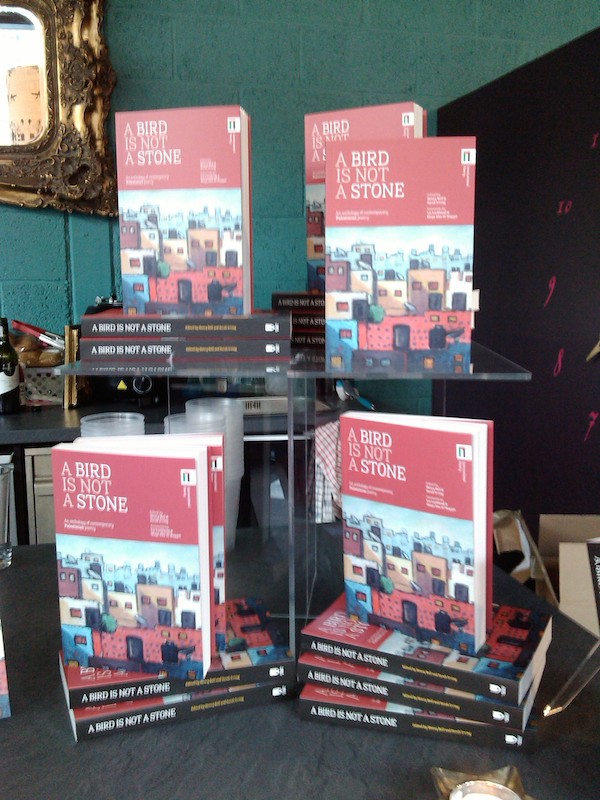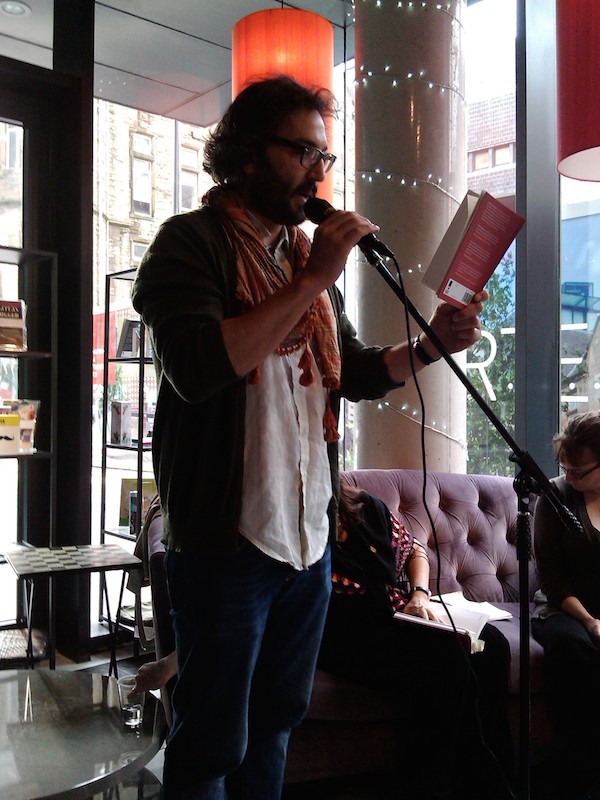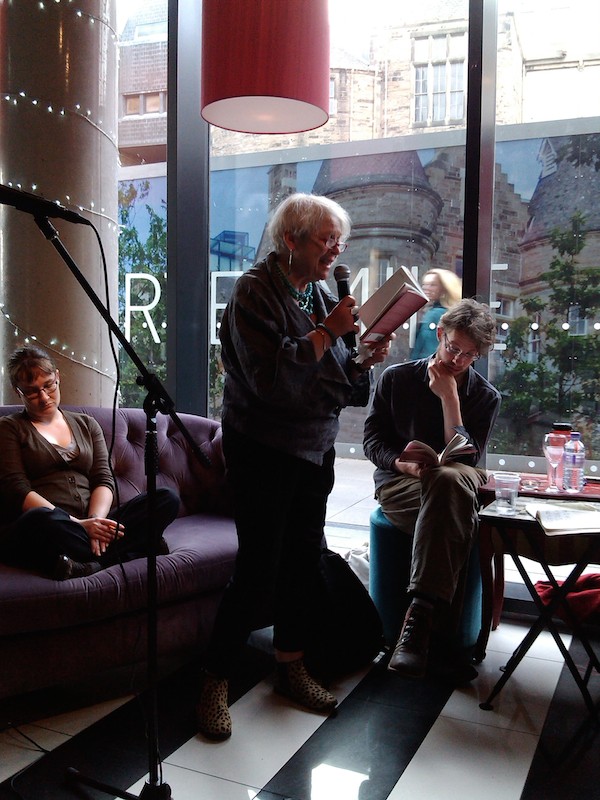Books – A Bird is Not a Stone
There are not so many book launches when the author is not present; when the book in question is an anthology, the absence of any of the contributors is even more remarkable. The poets whose work has been collected in A Bird is Not a Stone are all from Palestine: it is very difficult for them to enter the UK, but they are used to difficulties. It is hoped that some of them will be able to come to Scotland in future, but at Looking Glass Books on Wednesday their poems were ably read by some of the Scottish writers who have brought their poetry to life for non-Arabic-speaking audiences.
The anthology grew from a visit paid to Palestine by Henry Bell, Liz Lochhead, Henry King, Bill Letford and Lorna MacBean in 2012. There they visited the House of Poetry in al-Bireh and met Murad al-Soudani and Rana Barakat. Liz Lochhead said that it had been embarrassing to realise how little the Scottish contingent knew about Palestinian poetry, especially when Murad al-Soudani was able to talk so eruditely to them about such poets as Edwin Morgan. The Palestinians told them that apart from a few famous names such as Nawan Darwish, most were only ever translated for academic texts: the translations were dull, the poems often abridged – they wanted poets to translate their work into new poems. Henry Bell took on the project, and decided to put together a bilingual collection in Arabic and the languages of Scotland – English, Scots, Gaelic and Shetlandic. The House of Poetry chose the poems; Henry and the Scottish Poetry Library approached 25 Scottish poets. None refused the invitation.
The poems were first ‘bridge translated’ from Arabic into plain English, mainly by linguists from the University of Edinburgh; the Scottish poets then had the task of creating new and vibrant versions of the Palestinian poets’ works – versions that would retain the spirit of the original whilst also becoming works of art in their own right. Henry Bell’s co-editor Sarah Irving opened Wednesday night’s launch by dedicating the evening to Faysal al-Qarqati, one of the poets featured in the book. Mr al-Qarqati died suddenly in 2012 at the age of 58; his family is delighted that his work is part of A Bird is Not a Stone, so it seemed fitting that his poem should be the first read. Harry Giles has recreated the poem in Scots with the title ‘Haudin the kenmairk o hairst’ (‘a home with fall’s brand’), and he and Abla Oudeh (a Palestinian lecturer and translator who acted as translations editor for the book and who performed the Arabic version of each poem) took turns to read in each language. Harry said that the audience might at first find his ‘high’ version of Scots hard to follow, but asked them to ‘narrow your ears as you narrow your eyes in the sun.’ In language perhaps reminiscent of Gerald Manley Hopkins, the rhythm of the verses moved seamlessly between the two readers; many of us probably didn’t understand either set of words, but the sounds they made still resonated like a spell.
Liz Niven followed, with her Scots version of a poem by Yousef Abdul Aziz; Donald Adamson then read a work by Yousef Abu Loz, ending with the evocative line ‘I race with the flocks of the wind.’ Ryan Van Winkle took the stage with Abla to read a poem about ‘my country’ – Ryan’s reversioning of the words included the powerful lines ‘I swoon and swoop with the invaders’ hot breath on my neck’ and ‘I know my life is behind me, where I cannot fly.’
Rachel McCrum introduced her reading by saying that this was the first piece of translation work she had ever done. She’d been extremely nervous about the responsibility of recreating another poet’s words (in this case those of Abdul-Rahim al-Shaikh), still more so because of her unfamiliarity with Arabic culture. She researched around the subject and now felt more confident. The poem is entitled Catastrophe and is about the 1948 exodus from Palestine. Rachel explained that the exodus is still spoken about in the present tense in Palestine; it is a ‘continual state of being.’ Her reworking of the lines was exceptionally moving – ‘It is hard for the post to make it to paradise’, ‘There is no address, neither here nor there.’
Henry King followed Rachel with three poems, again read in tandem with Abla Oudeh. ‘For Her Eyes’, ‘Lamentation’ (which is set in Bethlehem, where the idea for A Bird is Not a Stone was first mooted – Henry ‘thought it was nuts’) and ‘Nonsense’ by Samih Mohsen, which includes the memorable line ‘(A bird) got its beak stuck in the cleft of my brain.’ Liz Lochhead then read a Scots version of ‘Nonsense’ by James Robertson; this time the title was ‘Havers.’
The performances were concluded by Liz, who spoke of her early involvement with the project, her visit to Palestine and the ‘terrible reality’ she found there. Reading from the introduction to the book, she asked ‘What else but beauty, truth and poetry have the courage to try (to deal with the situation)?’ She expressed her thanks not only to the poets themselves but also to the bridge translators, and she particularly praised the hard work put in by Sarah and Henry – ‘all I did was make pots of soup in my kitchen.’ Only poetry, Liz said, has the power to transcend borders.’
Liz then read some of her favourite poems from the anthology: ‘Horse’, ‘About the Wee Girl’ (‘she continues to die over and over, like the perpetual withering of young green leaves’), ‘The Engineering’, ‘Children’ by Maya Abu al-Hayyat (‘whenever I see a child’s hand sticking out of the rubble of a building, I check the hands of my three children’) and ‘Lament for the Mother’s Loss of Desire’ – this is the poem that Liz most enjoyed translating: it reminded her of the Beat Poets. It is the chant of a disillusioned woman who lists all the chores she has to do for her children, and talks scathingly of other women, ‘mothers with henna mudslides on their eyebrows.’
Sarah concluded the evening by thanking everyone involved in A Bird is Not a Stone, in particular the original poets themselves and Abla, whose huge input had been vital. Robbie Guillory of Freight Books is, Sarah says ‘probably the most experienced person there now is in the layout of dual language publications’ and she thanked Robbie and Freight for their unfailing support and enthusiasm. The title of the book comes from a sculpture by George Wylie, and Sarah also expressed gratitude to the George Wylie Foundation for allowing its use. The initial trip to Palestine was part-funded by the University of Glasgow and the book was given initial financial assistance by the Provost of Glasgow.
A Kickstarter campaign has raised £3,000 to fund the proposed visit to the UK of some of the Palestinian poets featured in the collection and to send copies of the book to Palestinian universities, schools, libraries and refugee communities: more donations are always welcome. The editors are also asking anyone due to visit Palestine to take some copies with them to distribute: if interested, email sarahirvingwork@gmail.com
All profits from the sale of the book will be used to fund more creative arts projects in Palestine.
A Bird is Not a Stone is published by Freight Books and is available from them.
Sarah Irving is a freelance writer and editor who is currently completing a PhD at the University of Edinburgh. She has worked and traveled in Palestine since 2001 and is the author of (amongst other works) The Bradt Guide to Palestine.
Henry Bell is a writer, activist and co-organiser of the Solas Festival and Fail Better.


